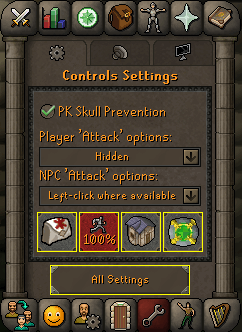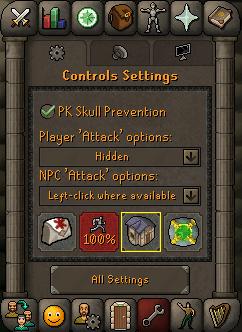Options¶
Methods to interact with the options gametab.

ERSOptionsTab¶
ERSOptionsTab = enum(CONTROLS, AUDIO, DISPLAY);
Enum representing each of the options tabs.
ERSOptionsSlider¶
ERSOptionsSlider = enum(BRIGHTNESS, ZOOM);
Enum representing the 2 important sliders the options gametab has available. Could be expanded in the future to include the sound sliders but for now only has this 2.
ERSOptionsDropDown¶
ERSOptionsDropDown = enum(PLAYER_ATTACK, NPC_ATTACK, CLIENT_MODE);
Enum representing each of the options gametab dropdowns.
TRSOptions¶
Main record responsible with interacting with the Options gametab.
Options.SetupGameTab¶
procedure TRSOptions.SetupGameTab();
Internal method used to setup the TRSOptions coordinates.
This is automatically called for you on the Options variable.
Options.IsOpen¶
function TRSOptions.IsOpen(): Boolean;
Returns true/false if the options gametab is open or not.
Example:
WriteLn Options.IsOpen();
Options.Open¶
function TRSOptions.Open(): Boolean;
Attempts to open the options gametab.
Example:
WriteLn Options.Open();
Options.GetTab¶
function TRSOptions.GetTab(): ERSOptionsTab;
Returns the currently active ERSOptionsTab.
Example:
WriteLn Options.GetTab();
Options.OpenTab¶
function TRSOptions.OpenTab(tab: ERSOptionsTab): Boolean;
Attempts to open the specified tab ERSOptionsTab.
Example:
WriteLn Options.OpenTab(ERSOptionsTab.DISPLAY);
Options.GetZoomLevel¶
function TRSOptions.GetZoomLevel(useCache: Boolean = True): Integer;
Retrieves the current zoom level.
By default it uses the value cached in TRSOptions.ZoomLevel if it is already set.
If it’s not set or if you decide to use this with useCache set to False,
TRSOptions.ZoomLevel will be updated with the value this returns.
Example:
WriteLn Options.GetZoomLevel();
Options.SetZoomLevel¶
function TRSOptions.SetZoomLevel(level: Integer): Boolean;
Sets a new zoom level through the options gametab.
If we successfully update the zoom level we update the cached
TRSOptions.ZoomLevel, if we don’t, we reset it to -1.
Example:
Options.SetZoomLevel(30);
Options.SetPlayerAttack¶
function TRSOptions.SetPlayerAttack(index: Integer): Boolean;
function TRSOptions.SetPlayerAttack(option: String): Boolean; overload;
Attempts to set the specified attack option for players.
Example:
WriteLn Options.SetPlayerAttack('Depends on combat levels');
WriteLn Options.SetPlayerAttack(2);
Options.SetNPCAttack¶
function TRSOptions.SetNPCAttack(index: Integer): Boolean;
function TRSOptions.SetNPCAttack(option: String): Boolean; overload;
Attempts to set the specified attack option for NPCs.
Example:
WriteLn Options.SetNPCAttack('Depends on combat levels');
WriteLn Options.SetNPCAttack(2);
Options.SetClientMode¶
function TRSOptions.SetClientMode(mode: ERSMode): Boolean;
Attempts to set the specified mode client mode.
Example:
WriteLn Options.SetClientMode('Fixed');
Options.RenderSelf¶
TRSOptions.RenderSelf();
Writes “::renderself” on the chat and presses enter.
This toggles your character being rendered.
Example:
Options.RenderSelf();
Options.GetRoofsState¶
function TRSOptions.GetRoofsState(): Boolean;
Returns the roofs state.
Example:
Options.GetRoofsState();
Options.HideRoofs¶
function TRSOptions.HideRoofs(): Boolean;
Attempts to hide roofs.
Example:
Options.HideRoofs();
Options.ShowRoofs¶
function TRSOptions.ShowRoofs(): Boolean;
Attempts to show roofs.
Example:
Options.ShowRoofs();
Options.GetBrightness¶
function TRSOptions.GetBrightness(): Integer;
Returns the current brightness level. By default it uses RSCacheParser for this so it doesn’t need to open the options tab.
Example:
WriteLn Options.GetBrightness();
Options.SetMaxBrightness¶
function TRSOptions.SetMaxBrightness(): Boolean;
Attempts to set your brightness to 100, which is the only value supported by WaspLib.
Example:
WriteLn Options.SetMaxBrightness();
Options variable¶
Global TRSOptions variable.

